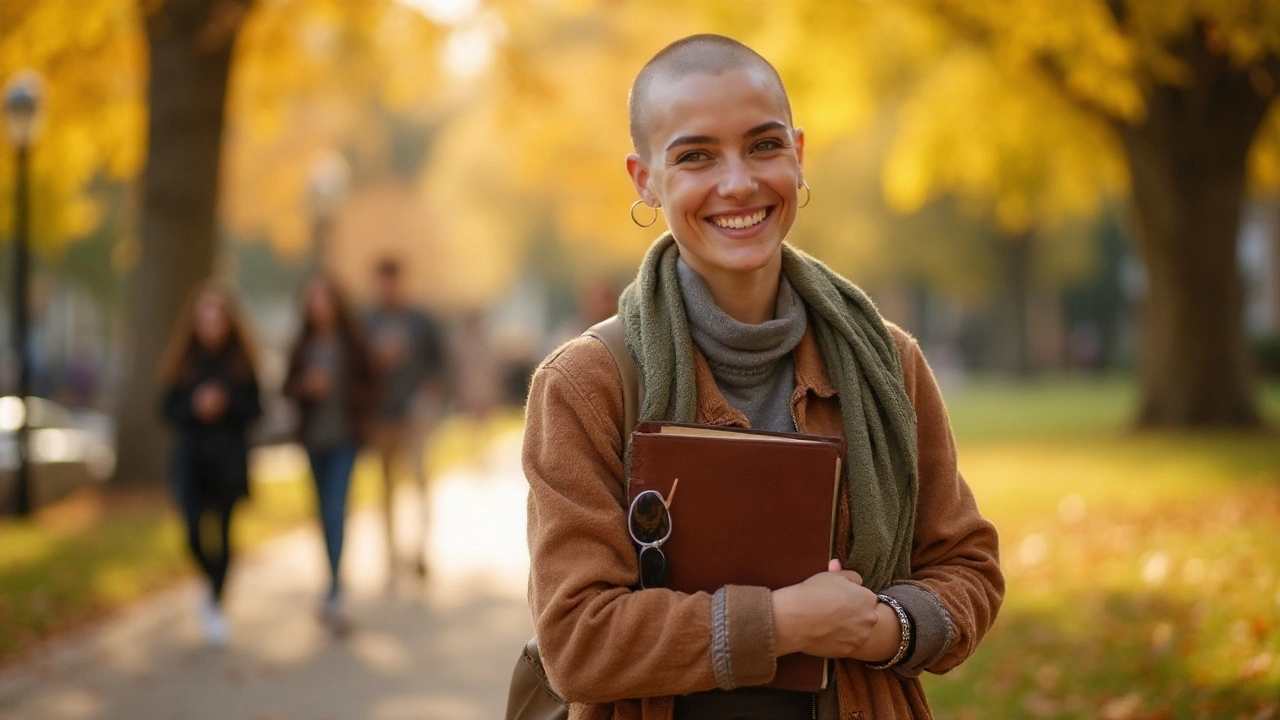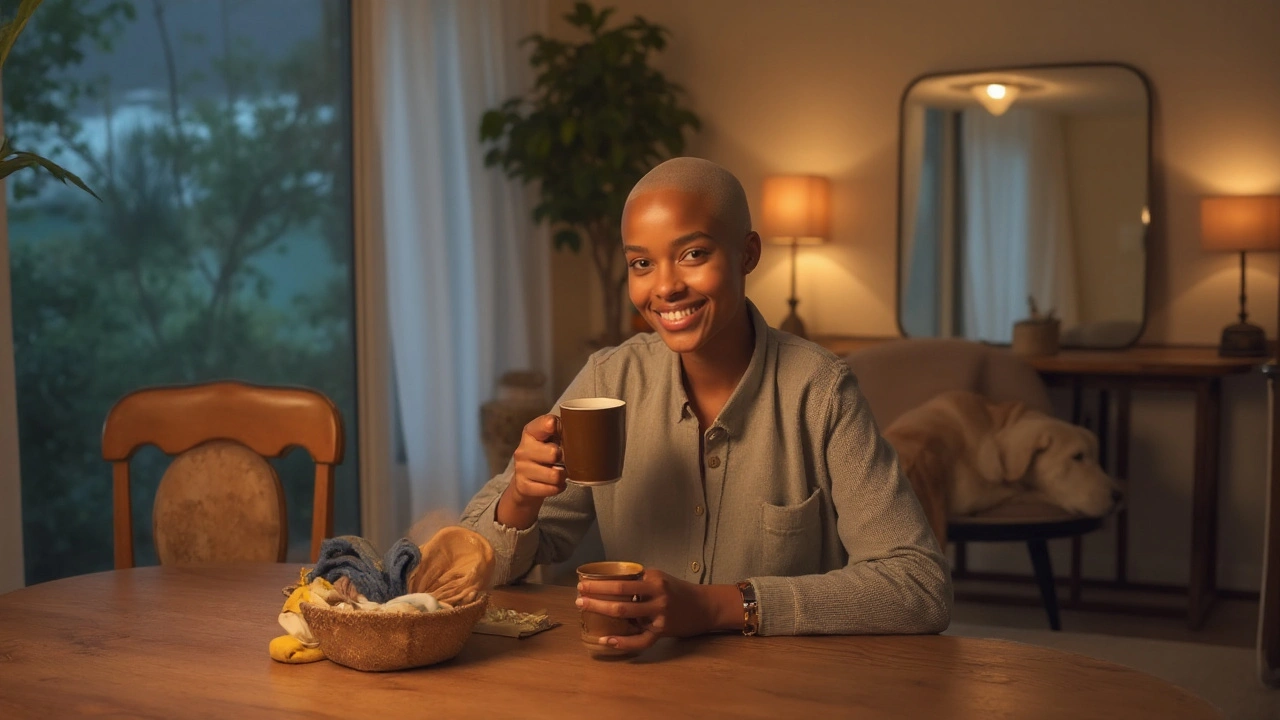
Alopecia Coping Strategy Quiz
Alopecia is an autoimmune condition that triggers hair loss on the scalp, face or body. It can appear as alopecia areata (patchy loss), alopecia totalis (total scalp loss) or alopecia universalis (complete body loss). While the physical signs are obvious, the hidden psychological fallout often feels far heavier.
Why Hair Loss Hits the Mind Hard
When hair, a primary cue of identity, disappears, the brain reacts like any other loss. Self‑esteem is the personal value we place on ourselves drops, especially in cultures that link hair to attractiveness and professionalism. Studies from the American Academy of Dermatology show that up to 68% of people with alopecia report feeling less confident in social or work settings.
The dip in confidence often spirals into Anxiety a state of persistent worry and nervous tension. Simple interactions-like meeting a new colleague or attending a family gathering-can feel like examinations. Over time, chronic anxiety may blend with Depression a mood disorder marked by persistent sadness and loss of interest, leading to missed appointments, isolation, and reduced treatment adherence.
Typical Emotional Reactions
- Grief: Like mourning a physical loss, many experience a sense of mourning for their former look.
- Anger: Frustration can erupt toward the body, doctors, or even family members who don’t "understand".
- Identity Crisis: Hair often carries cultural, religious, or gender symbolism; its loss can feel like losing a piece of self.
These reactions are normal but become problematic when they linger beyond a few weeks or interfere with daily functioning.
Evidence‑Based Coping Strategies
Fortunately, research and real‑world experience point to several proven ways to buffer the psychological blow.
| Approach | Primary Benefit | Typical Setting | Time to Notice Improvement |
|---|---|---|---|
| Cognitive Behavioral Therapy (CBT) | Reframes negative thoughts about appearance | One‑on‑one with a licensed therapist | 4-6 weeks |
| Mindfulness & Meditation | Reduces stress‑related flare‑ups | Solo practice or guided apps | 2-4 weeks |
| Support Groups | Provides shared experience and validation | Local meet‑ups or online forums | Immediate‑to‑1 month |
| Medical Treatments (e.g., steroids, JAK inhibitors) | Can halt or reverse hair loss, boosting confidence | Dermatology clinic | Varies - weeks to months |
Alopecia coping rarely relies on a single method. Blending mental‑health tools with medical care yields the best outcomes.
Cognitive Behavioral Therapy (CBT)
Cognitive Behavioral Therapy is a short‑term, goal‑oriented psychotherapy that challenges distorted thoughts helps patients replace "I look terrible" with "My worth isn’t defined by hair". A 2023 randomized trial showed a 45% reduction in depressive scores among alopecia patients who completed a 12‑session CBT program.
Mindfulness and Meditation
Practices that anchor attention to the present moment lower cortisol, a hormone linked to autoimmune flare‑ups. Even five minutes of daily breathing exercises can improve sleep quality-an essential factor for emotional resilience.
Support Groups
Support groups are regular gatherings where individuals share experiences, resources, and encouragement create a safety net. Whether it’s a local chapter of the National Alopecia Areata Foundation or an active subreddit, the sense of belonging reduces isolation by up to 60% according to a 2022 survey of 1,200 members.
Medical Options as Psychological Boosters
When a dermatologist prescribes effective medication, visible regrowth often restores confidence faster than any talk therapy alone. Dermatologists are medical doctors specializing in skin, hair and nail conditions can assess disease type, recommend steroids, topical immunotherapy, or newer JAK inhibitors that have shown 70% response rates in alopecia totalis.

Building a Personal Support Network
Beyond formal groups, leaning on friends, family, and coworkers matters. Letting close people know what you’re going through enables them to offer practical help-like styling tips or simple check‑ins. When you feel ready, sharing your story at work can dismantle stigma and perhaps inspire an inclusive dress code that accepts wigs.
Hair Prostheses (Wigs)
Wigs are custom‑made hair prostheses designed to mimic natural hair in texture and style are more than cosmetic cover-ups. A 2021 quality‑of‑life study found that 78% of participants who wore a well‑fitted wig reported a significant boost in daily confidence, especially in professional settings.
Practical Everyday Tips
- Own your story: Practice a short, honest explanation you can share when asked about your hair.
- Experiment with headwear: Hats, scarves, and turbans can become style statements rather than hiding tools.
- Maintain skin health: Gentle shampoos and sunscreen prevent scalp irritation that could worsen autoimmune activity.
- Stay active: Regular exercise releases endorphins that combat anxiety and improve mood.
- Schedule regular check‑ins: Whether with a therapist or dermatologist, consistent follow‑up keeps both mind and scalp in balance.
When to Seek Professional Help
If any of the following apply, reach out promptly:
- Depressive thoughts linger for more than two weeks.
- You avoid social events because of hair loss.
- Stress triggers noticeable hair‑loss flare‑ups.
- You’re uncertain which medical treatment fits your type of alopecia.
A combined referral-dermatology for the physical aspect and mental‑health counseling for the emotional side-offers the most comprehensive care.
Next Steps and Resources
After reading, you might explore these deeper dives:
- "Understanding Alopecia Areata: Triggers and Treatments" - a medical‑focused guide.
- "Mind‑Body Techniques for Autoimmune Conditions" - a holistic health article.
- "Building Resilience After Visible Change" - a mental‑health series on identity shifts.
Each topic expands the knowledge hierarchy, moving from the broad umbrella of "Health and Wellness" down to the niche of "Psychological Coping with Hair Loss".

Frequently Asked Questions
Can alopecia cause depression?
Yes. The loss of hair often triggers feelings of embarrassment and social anxiety, which can evolve into clinical depression if left unchecked. Early emotional support and therapy dramatically lower this risk.
Is CBT effective for people with alopecia?
Research shows CBT reduces negative self‑talk and improves coping skills in 40‑50% of participants within six weeks. It works by challenging the belief that self‑worth equals hair appearance.
What should I look for when choosing a wig?
Key factors include breathable cap construction, a hair type that matches your natural texture, and a reputable vendor offering custom sizing. A well‑fitted wig feels secure and looks natural, boosting confidence.
Are there support groups specifically for teenagers?
Yes. Organizations like the National Alopecia Areata Foundation run teen‑focused meet‑ups and online chat rooms that address school‑related challenges and body‑image concerns.
How quickly can medical treatments show results?
Topical steroids may produce regrowth within a month, while newer JAK inhibitors often need 3‑6 months for noticeable hair return. Your dermatologist will tailor expectations based on disease severity.






12 Comments
Honestly, most people just overreat to hair loss.
Dealing with alopecia can feel like navigating a storm without a map.
Your sense of self is tightly woven with the way you present yourself, so losing hair often shakes that foundation.
First, acknowledge the grief; it’s a natural response to any major change in appearance.
Give yourself permission to feel angry or sad, because suppressing those emotions only fuels the inner critic.
Next, create a short, confident script you can use when someone asks about your hair-something like, “I’m managing alopecia, and I’m fine.”
Practicing that script ahead of social events reduces anxiety and gives you a sense of control.
Consider joining an online support group; the shared stories and tips act like a virtual safety net, reminding you that you’re not alone.
If you haven’t already, look into cognitive‑behavioral therapy, which has been shown to reframe negative self‑talk into more balanced thoughts.
Even a few minutes of daily mindfulness meditation can lower cortisol levels, which may help keep autoimmune flare‑ups at bay.
Physical activity is another powerful tool-regular exercise releases endorphins that act as natural mood elevators.
Keep your scalp healthy with gentle shampoos and sunscreen; irritation can sometimes trigger additional hair loss.
Experiment with headwear that feels like an accessory rather than a mask; hats, scarves, or custom wigs can become part of your style identity.
When you feel ready, share your journey with trusted friends or coworkers; openness often reduces stigma and can inspire workplace accommodations.
Remember that progress is rarely linear; some days will feel better than others, and that’s completely okay.
Finally, celebrate the small victories-whether it’s a compliment you receive, a therapy session that feels helpful, or simply a day you walk out feeling confident.
While you’ve listed a solid toolbox, I’d add that tracking triggers-stress, diet, weather-can pinpoint flare‑ups, and a simple journal, often revealing patterns that therapy alone might miss, can be surprisingly effective.
From a psychodynamic perspective, alopecia operates as an embodied trauma, catalyzing identity dysregulation; the resultant affective valence often oscillates between self‑objectification and depersonalization. Integrative interventions must therefore address both somatic and symbolic dimensions.
Indeed, bridging somatic treatment with narrative therapy can restore agency; encouraging patients to author their own story around hair loss often mitigates the sense of helplessness.
Hey, I totally get how weird it feels to explain the situation at work-just throw in a quick line like “I’m dealing with a condition, but I’m good,” and move on, no drama.
Providing a concise explanation indeed reduces social friction; studies show that brevity in disclosure correlates with lower perceived stigma among peers.
Take action now: schedule a CBT session, join a local support group, and ask your dermatologist about the latest JAK inhibitor options-delaying only prolongs the emotional toll.
While the prescriptive urgency is commendable, one must also contemplate the phenomenological aspect of acceptance; the dialectic between agency and surrender often dictates long‑term resilience.
Seeing hair loss as a shift rather than a loss can reframe the narrative; it becomes a chance to explore new facets of self‑expression without the previous constraints.
Totally feel you 🙌 new look new vibe 😎 keep rocking it
Moreover, integrating psychophysiological feedback-such as heart‑rate variability monitoring-into CBT protocols can quantitatively track stress reduction, thereby offering a data‑driven validation of therapeutic progress.